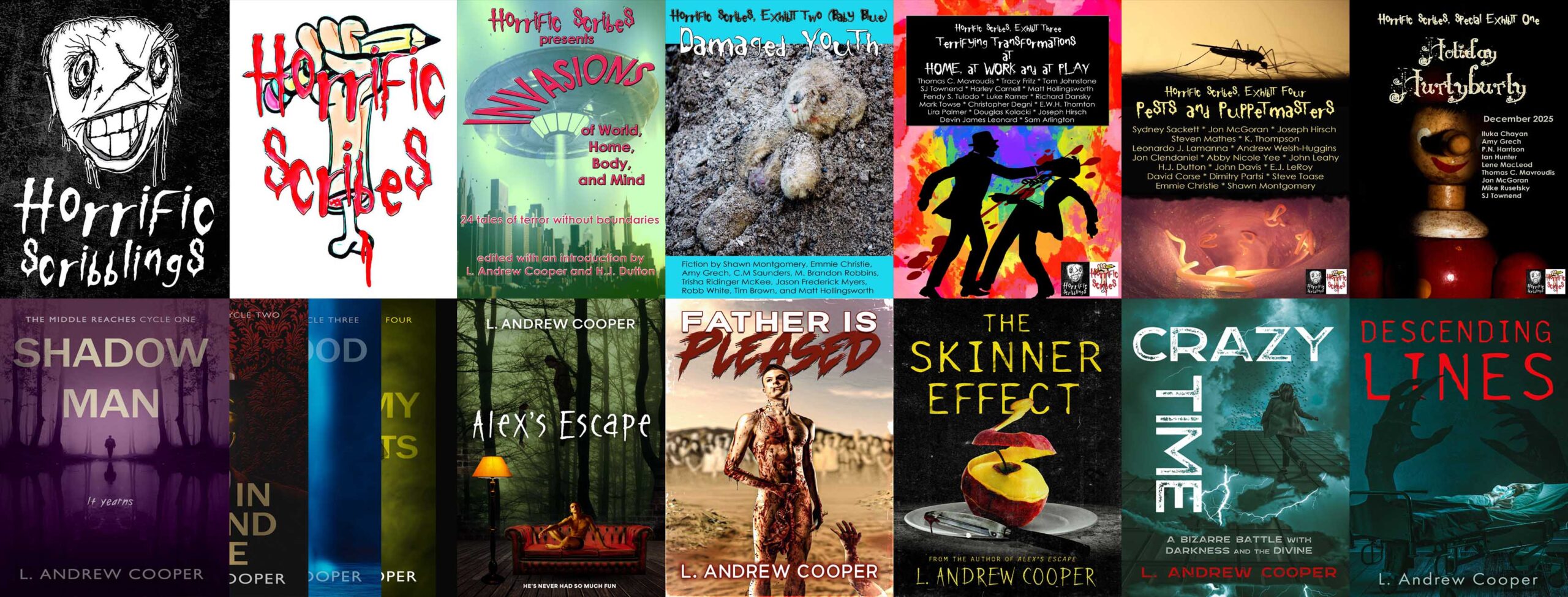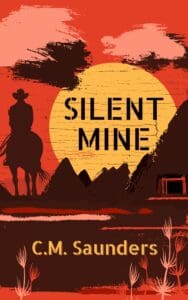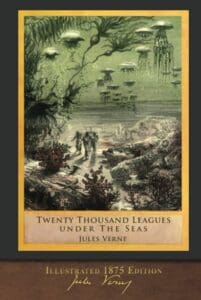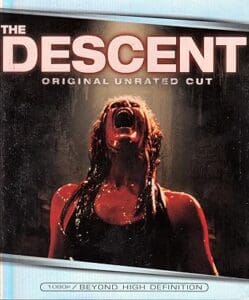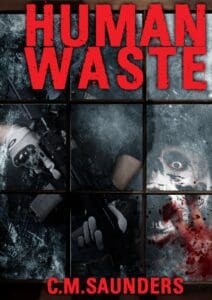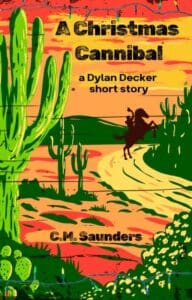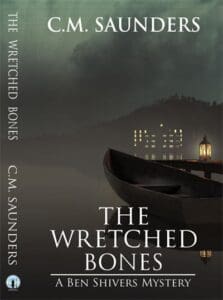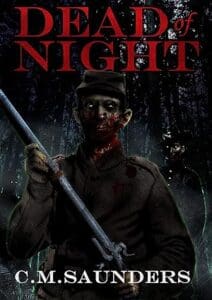Silent Mine may be a quick, fun read, but it also offers plenty for deeper thought and perhaps more profound shivers, and author C.M. Saunders is here to reveal some of his thoughts about the novella’s well-researched background and larger thematic framework.
Silent Mine
In 1879, Dylan Decker rides his trusty steed Skydance across California in pursuit of a lost man, Thomas Winstanley, whose wife needs to know if she has been jilted or widowed. He was last known to be headed toward a place called Silent Mine and in searching for him, Decker encounters a town full of locals who clam up every time the mine is mentioned, two cutthroat bandits with their own horror stories, and a group of natives who understand what truly lurks in the dark recesses of the mine.
But none of them can deter Decker from keeping his promise to Mrs. Winstanley. He will solve the mystery, regardless of the cost.
Will he survive the horrors in front of him, or will he share the fate of the man he seeks in C.M. Saunders’s action-packed western horror novella, Silent Mine?
Interview
1. Melding Archetypes. Genres don’t exist without conventions that tell readers you’re in a western or you’re in a horror story, and Silent Mine front-loads the western conventions, starting in in the dusty town where a saloon scene kicks off the action and progressing to bandits and natives. How do you make these conventions your own as well as recognizable yet fresh-feeling experiences for readers? Along the way, you gradually blend in horror conventions, increasing talk of curses and creatures. How natural did the blend feel while writing it, and how jarring should it feel for readers? Dylan Decker doesn’t reach Silent Mine until more than halfway into the story… but at what point should readers feel they’ve passed from standard western territory into a more horrific universe?
CMS: Conventions are important. Not least because they help set the scene, offer a measure of familiarity, and help the reader find a gateway inside the story. That said, western horror is a new genre for me, and I had never even read any until recently. I have dabbled in a lot of things, but until now most of my fiction has veered more toward traditional horror or sci-fi, so there was a lot of experimentation involved to try to find out what worked and what didn’t. My objective was to write a fast-paced, action-packed story readers could get immersed in and finish in one sitting. They should be able to recognize it isn’t your average western pretty early on.
My newfound fascination with western horror is a legacy from the Covid lockdowns and too many hours spent playing the videogame Red Dead Redemption 2. In Silent Mine I wanted to convey that sense of unease and reinforce the idea that anything could happen at any moment, which was probably more prevalent a century ago when so much of the country was still unmapped and day-to-day survival was a lot more difficult. I wasn’t there, obviously, but I imagine people lived in a near-constant state of peril. I deliberately introduce the supernatural elements slowly to give the reader time to adjust, so when the final horror is revealed, they are primed, and hopefully it doesn’t come across as too jarring. At the same time, I wanted to retain an element of realism and not stray too far into the fantastical. That’s where I hope my research and attention to detail will pay dividends.
2. Melding Lores. On his journey, Decker encounters the Chumash, appropriate given his general location, and they give him a folkloric account much richer than the frightening rumors he has heard about Silent Mine. Why did you decide to include this lore in your story? How much research did you do about the Chumash, and does the account in your book have any similarity to their actual lore? In any case, it feels plausible, and later in the story, it resonates with other lore, including Welsh. What inspired this connection?
CMS: Great observations! Yes, I did research the Chumash and their belief system, though I may have used a little artistic license when referencing it in the book. I find it fascinating how many of these ancient civilizations have such similar core beliefs. There is so much crossover it’s almost as if there are invisible threads binding them together. For example, almost every culture has a tradition of little people, or fairy folk, and they are usually said to live underground. Inevitably, cultures with mining traditions have long talked about interactions with these entities. In Devon and Cornwall, they were said to be intrinsically mischievous and often held responsible for missing tools or food, while in Wales they were known as the coblynau, and had a far more sinister reputation. In both cases they were identifiable by the knocking sounds they made underground, and when the first British settlers moved to America those beliefs were transplanted and morphed into The Tommyknockers, which you might recognize from the Stephen King book. By grounding the story in existing folklore, I hoped to make it more convincing. Something similar to the events described in the book actually happening somewhere at some point isn’t completely beyond the realms of possibility. That, I think, adds another layer of authenticity.
Depicting the Chumash as being more open to the supernatural was also deliberate. I’m sure the white settlers had their own superstitions, but they would have been unfamiliar with the land and the legends associated with it. In that environment I think they would have been more pragmatic and focused on material things they could understand. Like gold. They were probably very dismissive of any local folklore they may have come to learn about, partly through an inherent fear of the unknown.
3. Melding Influences. Decker carries a prized copy of Jules Verne’s Twenty Thousand Leagues Under the Sea (1870) and reflects on having always read science fiction and been “seduced” by “fantastical worlds.” What does his quest to pursue a lost man in a place where more and more people warn him not to go say about the influence of fiction? Did Verne and other writers from the late nineteenth century influence the adventurous spirit of Silent Mine? I suspect other influences… Robert E. Howard? Arthur Machen? Algernon Blackwood? I’m thinking of one story in particular, but perhaps obviously—H.P. Lovecraft? Skipping forward, the film The Descent (2005)? If I scored any hits, how so? Whether or not I did, who/what were your biggest influences, and how?
CMS: I referenced Twenty Thousand Leagues Under the Sea not only because it fit the time frame but also because it was an important book in my own life. Plus, I wanted to use it as a mechanism to hopefully instill something of Dylan’s character in the reader’s mind. In a novella, you don’t have much time to play around. Things must happen quickly, and everything has to be relevant to the story. It’s fun to use little tricks like that. I think the reader might have a completely different impression of Dylan had he been carrying around a copy of Wuthering Heights or Great Expectations. True, Arthur Machen also plays his part in forming Dylan’s character, not least because they both have Welsh blood. Another of those little strings, along with the coblynau of Welsh legend, binding the story together.
Good shout on The Descent! It was definitely a big influence, though I didn’t set out to write an homage. The similarities only became evident later. I loved the claustrophobic feel of the movie and tried to replicate it in the latter stages of Silent Mine. Incidentally, though set in North America, The Descent was filmed in Scotland by Neil Marshall, who also directed Dog Soldiers. I have a penchant for British horror (Howl, Outpost, 28 Days Later, Censor, etc.), I think largely because I relate to the dark humor that often runs through it like an undercurrent. For me, horror and humor often go hand-in-hand. I love the contrast between light and dark, and there are definite moments of absurdity in the Dylan Decker universe.
Taking up your main point, most of my personal influences are literary. MR James, HG Wells, and Jules Verne of course, and I grew up on a steady diet of King, Koontz, and Graham Masterton. I later discovered slightly more ‘out there’ writers like Richard Laymon, Chick Palahniuk, Koji Suzuki, and Jack Ketchum. But perhaps my biggest single influence, especially stylistically, has been yet another Welshman, Roald Dahl. He is usually seen as a children’s writer, but most of his stuff was pretty dark. Charlie and the Chocolate Factory being a prime example.
4. Survivalism, Self-Reliance, and Masculinity. I know the film tradition much better than the written one, but when I think of the traditional western (say, up to 1968), I expect the story to address two topics, and Silent Mine hits both. Decker travels alone with his “trusty steed.” To what extent is Decker’s ability to rely on himself a part of his sense of being a man, and to what extent does it reflect his time and culture’s definition of a certain type of manliness? Do you want him to match up with a certain ideal of a rugged frontiersman, or do you think he challenges that ideal? Why might loneliness be a part of manliness? In addition to his horse, some of Decker’s trustiest companions are his Colt and his Winchester. In the western, to what extent do the guns make the man? Decker reflects on not keeping count of the men he’s killed or the women he’s slept with. Is that kind of detachment manly in this context? Why or why not?
CMS: Great question(s). Well, clearly Dylan Decker is very much a man’s man. A stereotypical emotionally detached loner with a huge chip on his shoulder. He tries to do the right thing. Mostly. But other people keep pushing him off course, and he isn’t one to let those things slide. But it’s all done with tongue firmly in cheek. As Silent Mine is the first in a series, I feel I have plenty of time to explore the character and maybe take him out of his comfort zone. The publisher, Undertaker Books, is very progressive, and I’m sure would be open to most things, but this early on, it’s more about setting the scene. It was a very different time in the Wild West, and I think the book had to reflect many of those ideals. But once certain tropes are embedded in the reader’s mind, it might be fun to play with them a little and see how far I can push the envelope.
The weaponry plays a huge role in the book. In that time guns and knives were essential survival tools but were often also kind of status symbols. Your choice of weapon also says something about the kind of person you are, I think. For example, using a Winchester rifle might suggest the character is rational and reasonable, though at the same time is no stranger to violence and wants to be prepared for any eventuality. On the other hand, to go into every situation brandishing a double-barreled shotgun would probably mark you down as irresponsible and uninhibited. Another reason I wanted to highlight the Winchester is as a nod to the Winchester Mystery House in California, built on the proceeds of gun sales and, according to Sarah Winchester, widow of William Wirt Winchester, haunted by the spirits of those it had killed.
A few years ago, I wrote a book called Human Waste, about a survivalist faced with a zombie apocalypse, which sort of pokes fun at the whole concept of preparedness. The twist was that there was no zombie apocalypse, which seemed to go over a lot of people’s heads. Something in this guy’s mind had snapped, and he started seeing zombies instead of humans and giant alien insects instead of SO19 (British equivalent of SWAT) teams. The crux of the story was that he had been prepping all his life, he just didn’t know what he was prepping for, and when no reason presented itself, his deranged mind invented one because otherwise all that time and energy would have been wasted. You have to trust your readers to draw their own conclusions, and sometimes, for whatever reason, they draw the wrong ones.
5. Survivalism, Self-Reliance, and American Identity. Whether American, Italian, or otherwise, the traditional western also addresses American identity as it formed during white America’s western expansionist period, which Silent Mine also does not neglect. As a character, how does Dylan Decker relate to the traditional western hero? His survivalist skills and instincts, along with the aforementioned self-reliance, fit at least a certain profile of what are touted as American virtues. Does your story celebrate these virtues? Why or why not? The story does represent a Chumash perspective on Decker’s quest to reach Silent Mine, which to them seems like the quest of yet another white man plunging foolishly into things he doesn’t understand. As a post-1968 western horror story, do you think your western is more willing to admit critical perspectives on American identity? Why or why not?
CMS: You picked up on so much! Regarding the attitudes of the Chumash, I really tried to put myself in their shoes. How would I feel if an outsider suddenly turned up on my doorstep, ignored well-intended advice, and ran headlong into a situation he couldn’t even comprehend? And for what? Money? In Dylan’s case, it isn’t even that. He is driven by this overbearing sense of doing the right thing. Or what he considers is the right thing. Which, of course, is subjective. Basically, it’s about his ego. And that self-reliance. Going steaming in is such a silly, gung-ho, but typically male thing to do, and I imagine the Indigenous people were quite jaded by it all and probably spent a lot of time walking around shaking their heads in disbelief. I tried to flip the script a little with the role Nina, the young Chumash girl, plays. Without giving too much away, Dylan ends up deeply indebted to her. I couldn’t make it too obvious, but it was my hope that readers would be astute enough to realize how much that must affect someone like Dylan. Not only is she native American, and female, but she is also younger and physically smaller than he is, but in the final showdown, none of these perceived weaknesses matter.
Regarding American identity, as an eighties kid my interpretation of it is very much influenced by movies like Rocky and TV shows like Magnum PI and Miami Vice. If you look back at my list of literary influences, they are mostly American, and most of my favourite musical artists (Bruce Springsteen, Foo Fighters, Green Day) come from the same place. As an outsider watching on from across the pond, in my mind being American meant you stood for noble causes and were blessed with certain inherent traits, such as resilience, resourcefulness, a sense of justice, all the things I bestowed upon Dylan Decker. But these positive elements only represent one side of the human character, regardless of where you come from, and this is something Dylan has to reconcile.
6. The Senses. Especially once Decker reaches the mine, your book pays a significant amount of attention to senses other than sight, especially smells (rot is pervasive and disgusting) and sounds (dripping water, what might be voices or screams). Why is employing a fuller sensorium so important for your story? Even if they have never experienced anything like what Decker smells, do you think readers will be able to smell along with Decker? Why or why not? As for sound, it becomes an integral part of the horror, as in The Descent or the more recent A Quiet Place (2018) and its sequels. Those examples are films, though. How do you create suspense and horror with sound in writing?
CMS: Again, well spotted! I think writers simply describing what their characters see is an overused technique. It is effective, yes, but it’s also lazy. That was one reason I wanted most of the action to take place either at night or deep in the darkness of mine, where visibility would be limited. It forced me to be more creative in my sensory descriptions, and it forced the reader to pick up on non-visual clues. From a technical perspective, I think the moment you say it is dark, you are more-or-less clueing the reader in and asking them to be prepared for less conventional elucidation. You are throwing down a gauntlet, and at the same time picking it up and running with it.
7. “The retribution of the universe.” At one point, Decker worries about what I have quoted—the idea that he might face cosmic comeuppance, and perhaps the trip to Silent Mine is it. This idea resonates with the idea of a curse that characterizes Silent Mine from the beginning. In the universe of your story, how serious is the possibility of a curse, be it a big one like the one that could afflict Silent Mine or a more personal one like the one that might be on Decker’s head? If, in your universe, monsters might be real, might curses be real? Other cosmic forces? Forces as big as Fate?
CMS: The notion of a curse stems from Dylan’s sense of guilt. Though he tries to be a good man, as I touched on previously, the concepts of “good” and “bad” are subjective. and he lives in constant fear of being punished for the bad things he has done or been forced to do. I don’t know how well it comes across, but Dylan has essentially rejected conventional religion but acknowledges that there are forces at work in the universe. Fate, destiny, karma, luck, whatever you want to call it. This mirrors my own philosophy and is something I intend to explore more thoroughly in later books.
8. The Horrific Sunset. In our correspondence, you mentioned that Silent Mine is the first in a planned series of western horror stories. What can you tell us about where you’re going next? I won’t spoil whether Decker survives Silent Mine, but you could always write prequels—will Decker appear again? Though you give it a nice twist, the cursed mine seems like a classic kickoff for a western-centered series—what other horrors do you have in mind?
CMS: The Dylan Decker books will each be set in the same universe and feature the same central character, though each will be written as a standalone. The reason for this is that I want to make them more accessible. The reader will be able to pick up any Dylan Decker book and find a complete story with a beginning, a middle, and a satisfying conclusion. There may be an odd Easter egg or reference to other stories, but there won’t be any requirement to read the other parts. With a lot of series out there, you are expected to read X, Y and Z in order, and it’s a big commitment. I wanted to strip it right back and write a series of fast-paced, tension-filled stories in the tradition of the old pulp fiction books.
Another sort-of installment, a short story called “A Christmas Cannibal,” is already out on Undertaker Books. This, you might deduce, is a Christmas-themed story. In fact, you can deduce a lot from that title, but it shouldn’t affect the reader’s enjoyment. When his horse Skydance is stolen, and Dylan is left for dead in the wintery badlands, he follows the thief’s tracks to a nearby town which is in full festive swing. Let’s just say this time, Dylan may have bitten off more than he can chew.
Later in the year, another Dylan Decker release is scheduled, again on Undertaker Books. Titled Meeting at Blood Lake, it’s about a town under siege from a flying cryptid in the Thunderbird/Mothman vein.
The potential for future books is endless. I like melding truth and fiction and riffing off already-established concepts, either rooted in folklore or documented history. I would love to pit Dylan against a werewolf or vampire, or maybe send him to somewhere like Skinwalker Ranch.
9. Going West. Also in our correspondence, you signaled that this book is a bit of a departure for you, and I can see from your many horror successes that the western part is the departure. What made you decide to go west? Although we’ve implicitly addressed some of the differences, what’s similar between writing the western elements and other writing you’ve done, and which of your earlier publications show those similarities most clearly? In other words, if readers love Silent Mine, where should they go next?
CMS: The aforementioned Human Waste springs to mind, which has many of the same elements. Except with less horses and better weapons. Another recent book of mine, The Wretched Bones, also has similarities in the sense that it features a lone protagonist with a traumatic backstory on a quest for answers. In this case he is a paranormal investigator who lives in a mobile home with a stray cat who gets called in to investigate an exclusive retreat where people tend to have a lot of accidents.
But perhaps the most similar in terms of a fast-paced, bloody read is Dead of Night, which is about a young couple who go on a camping weekend and end up fighting off an army of undead confederate bushwhackers. In fact, it’s so similar I have been thinking of writing an origin story using Dylan Decker’s character.
10. Access! How can readers learn more about you and your works (please provide any links you want to share)?
https://cmsaunders.wordpress.com
https://twitter.com/CMSaunders01
https://www.facebook.com/CMSaunders01
https://undertakerbooks.com/blogs/signed-authors/c-m-saunders
https://www.amazon.com/stores/author/B0034QAX0E
About the Author
Chris Saunders, who writes fiction as C.M. Saunders, is a writer and editor from New Tredegar, Wales. After teaching English in China for several years, he worked extensively in the publishing industry, holding desk jobs ranging from staff writer to associate editor, and is currently employed at a trade publication. His fiction has appeared in numerous magazines, ezines and anthologies around the world including The Literary Hatchet, Crimson Streets, 34 Orchard, Phantasmagoria, Burnt Fur, and DOA volumes I and III, while his books have been both traditionally and independently published. His latest release is the horror western Silent Mine on Undertaker Books.
